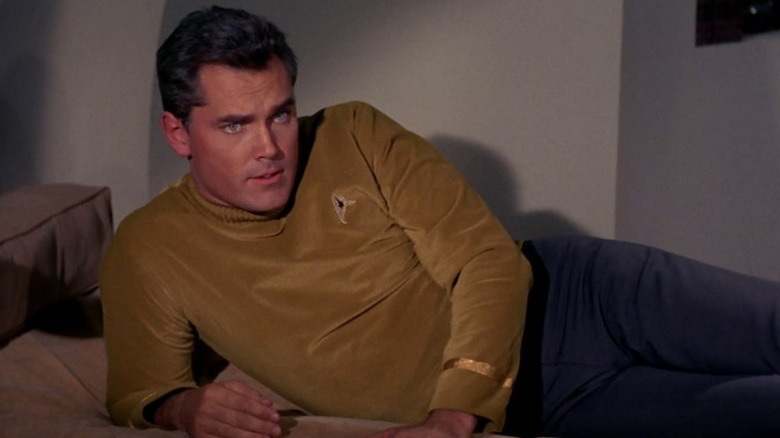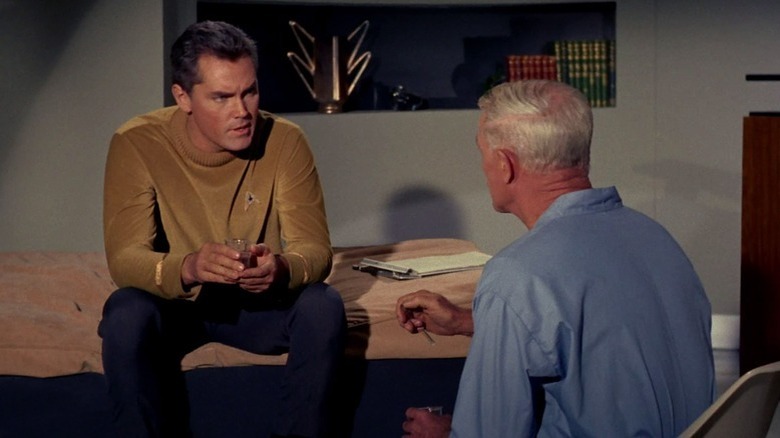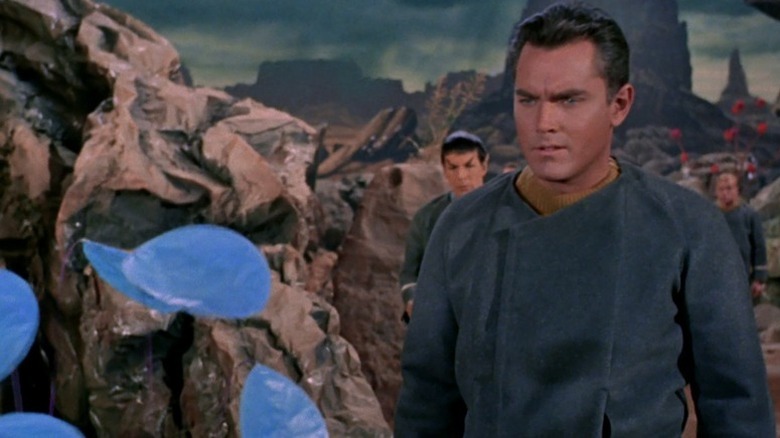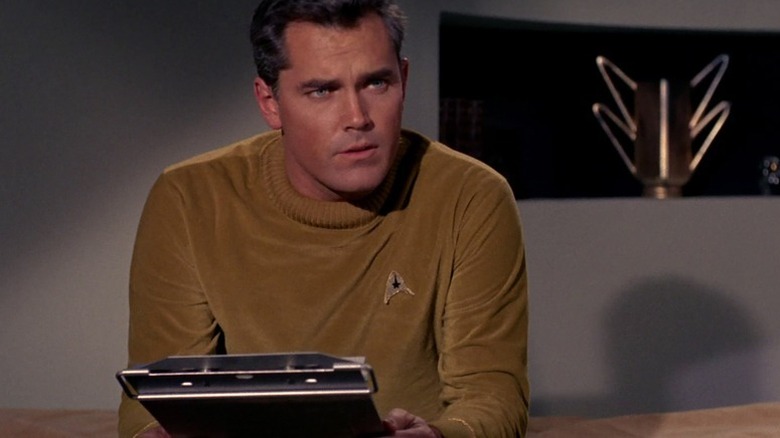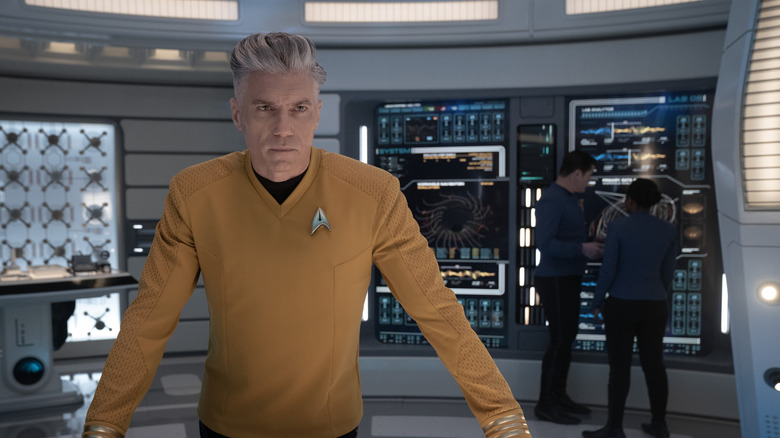Why Star Trek's Original Captain Pike Actor Jeffrey Hunter Quit The Series
Before there was William Shatner, there was Jeffrey Hunter. The actor may not be a household name today, but when "Star Trek" was in its infancy, he was a rising star in Hollywood — and an undeniable heartthrob. Hunter famously played the Enterprise's original captain, Christopher Pike, in Gene Roddenberry's first "Star Trek" pilot, but he didn't return when the show was given a second chance to perfect its first impression, leading Roddenberry to come up with the Captain Kirk character instead. The reason for Hunter's exit? Well, it depends on who you ask.
The second "Star Trek" pilot was made nearly 60 years ago at this point, so it's no surprise that some of the details of its creation have been muddled or lost over the years. There's no shortage of information about Hunter's involvement with the show, but accounts of his exit differ wildly. It's common knowledge that when "Star Trek" mastermind Roddenberry started working on a new series pilot, Hunter didn't come back to portray Captain Pike. Instead of recasting the character, Roddenberry conceived of an entirely new captain and crew, with only first mate Spock (Leonard Nimoy) overlapping between the two versions. Eventually, audiences would see chunks of the initial pilot episode, initially titled "The Cage," in the season 1 two-parter "The Menagerie."
Jeffrey Hunter's performance as Captain Pike was excellent on Star Trek
Hunter's performance in "The Cage" is intense and angry. The plot involves the U.S.S. Enterprise traveling to a distant world called Talos IV in response to a distress signal. When they arrive, however, Pike is kidnapped by large-headed psychic aliens, the planet's natives, who live in caves below the surface. They keep Captain Pike in a stone cell, and psychically project fantasies into his brain, hoping to convince him to remain their prisoner. The Talosians, you see, are dying out, and they hope to build up a new army of human slaves. They will achieve this by convincing Pike to mate with another prisoner of theirs, a pretty blonde woman named Vina (Susan Oliver).
Pike, however, is resolute in resisting the aliens. He finds that emotions like hate and anger are too intense for the Talosians to psychically absorb, so he keeps his hatred focused on them, able to resist their hallucinations. Jeffrey Hunter's performance is fierce and severe. He clenches his fists, grits his teeth, and resists all the attacks and temptations hurled in his direction. Some rumors have circulated for years that Hunter's performance was so overwhelming, that studio executives declared him to be too scary for "Star Trek" audiences. These rumors aren't true, though, and Hunter's intense performance is mostly just mesmerizing.
As mentioned, "The Cage" was eventually recut and supplemented with new "Star Trek" footage, extended it into a two-part episode called "The Menagerie." In that episode, Sean Kenney played an older version of Captain Pike, severely injured by radiation burns, unable to speak, and relegated to a high-tech wheelchair. The plot of "The Menagerie" involved an agreement between Pike and Spock to return him to the Talosian planet to live happily with Vina and the Talosians; when injured, their illusions are welcome. Spock, Kirk, and the rest of the new cast watch footage from "The Cage" on a viewscreen.
It's a pity Jeffrey Hunter couldn't return for a cameo, but at least his character was acknowledged and eventually given closure within the proper "Star Trek" canon.
The official word was that Jeffrey Hunter was just unavailable to return for Star Trek
Captain Kirk actor William Shatner said creator Gene Roddenberry once confided in him that Hunter and his wife were tough to deal with, and he decided they should part ways after facing too many "tantrums, restrictions and ultimatums being laid out on the table." This is a fun, sensational take on the situation, but it doesn't fully match up with other sources. Some sources, like "The Star Trek Encyclopedia," simply note that Hunter was "unavailable" for the new "Star Trek" timeline, a typical problem actors face when one pilot episode eventually turns into a years-long commitment. One source, Brian J. Robb's "A Brief Guide To Star Trek," states that NBC didn't like Hunter's casting, and that coupled with the actor's hesitance at committing to a full series led to his option not being picked up for the second pilot.
Other firsthand accounts shed more light on the story Shatner and Nimoy parroted. The "Trek" blog Fact Trek obtained audio of an interview featuring Oscar Katz, who was Executive Vice President for Trek company Desilu at the time of the second pilot. At an early fan convention, Katz told attendees that Hunter hadn't actually seen his "Star Trek" pilot by the time the show was set to make a second one, but the studio was desperate to keep him on board after spending over half a million dollars on the footage that featured him previously. "Before he re-signed, he wanted to take a look at it," Katz explained. "A screening was set up where Gene and I — I think [fellow Desilu executive] Herb Solow was there — in a very large screening room at Desilu, invited Hunter in to see 'The Menagerie.'"
William Shatner and Leonard Nimoy shared one version of the story about why Jeffrey Hunter did not return
Actor Sean Kenney played Pike in additional footage shot for "The Menagerie," while Anson Mount went on to breathe new life into the character in the recent Paramount+ hit "Star Trek: Strange New Worlds." Hunter left the show before it actually started, due to what several accounts cite as an issue involving his then-wife Joan Bartlett. In Leonard Nimoy's 1995 memoir "I Am Spock," the actor notes that he was the only character to return after the initial pilot, "because Jeff Hunter was let go when his wife began to represent him and made what Gene [Roddenberry] considered excessive demands."
Shatner also touched on this story in his own "Trek" book, the 1993 volume "Star Trek Memories." In that account, he notes that the official story at the time was that Hunter wasn't available for the series by the time the pilot was being re-shot, but that wasn't the case. "In truth, Hunter wasn't so much 'unable to commit to the series' as he was fired," Shatner wrote. "Apparently there were problems with Jeffrey. Not while he was shooting or on the set or anything like that, but afterward." Shatner said that when the second pilot was in development, Hunter's wife "suddenly started coming to production meetings." His account says that she "hated the first pilot, and as a result she began to frequently storm into Gene's office, loudly making demands like 'from now on, my Jeff must only be shot from certain angles.'"
Star Trek producers shared differing memories of the pilot screening
Katz said that Hunter and his wife screened the episode with the three men who wanted him back on the show, and he could tell from the whispering between them that "at least one of them hated it." After the screening, Katz got word that Hunter didn't want to do the show anymore, as he didn't like the way it had turned out. Initially believing this was a negotiating strategy, Katz instructed the business affairs department to try to keep working with Hunter's agent. "Weeks went on ... our business affairs department and his agent were miles apart and finally we were running out of time, and worse than that, our tempers were getting short," Katz recalled. "One day I said, 'Well, forget it, we'll sign another lead. Forget the $645,000 worth of film.'"
Yet another account, from Solow and producer Robert H. Justman's book "Inside Star Trek: The Real Story," insists that Hunter didn't actually show up for the screening at all, but his wife did. "As the end credits rolled, and the lights came up, Jeff Hunter's wife gave us our answer," they wrote. "'This is not the kind of show Jeff wants to do, and besides, it wouldn't be good for his career,'" they recalled Bartlett saying. "'Jeff Hunter is a movie star.'" At least one detail of this account is incorrect, as the book called Bartlett "Sandy" when her nickname was actually "Dusty." But there does seem to be one primary source proving that this screening happened (with or without Hunter): Fact Trek found an invitation from Roddenberry to Hunter, in which the "Trek" creator wrote that the network was interested in the show but "a little afraid to do something this unusual."
Everyone agrees that Jeffrey Hunter passed on Star Trek
Roddenberry seemed to be trying to convince Hunter to give the show a chance in the letter, as he continued, "In any case, I think it is important that you see the film. You and I may have to sit down someday soon and it would be impossible for us to talk objectively unless you had viewed it and had time to digest it." A later letter from Roddenberry to Hunter, obtained by site Star Trek Fact Check and originally shared in "Star Trek Creator: The Authorized Biography of Gene Roddenberry," shows that Roddenberry got the news that Hunter passed on the project secondhand. "I am told you have decided not to go ahead with Star Trek," he wrote. "This has to be your decision, of course, and I must respect it."
The TV creator added that he harbored "no grudge or ill feelings" and that he would "continue to reflect publicly and privately the high regard I learned for you during the production of our pilot." It sounds like in the end there were no hard feelings between the men, at least not on the record. As for why exactly Hunter (or Bartlett) decided they were no longer into the admittedly cheesy greatness that was "Star Trek"? Well, one additional source ventured a guess: in his Roddenberry biography "The Man Who Created Star Trek," author James Van Hise said that ultimately, "Hunter's wife convinced the actor that science fiction was beneath him." Unfortunately, this may have been a miscalculation: Hunter's biggest roles in films like "The Searchers" and "King of Kings" turned out to be behind him by the time he was given the chance to play Captain Pike full time. He passed away in 1969, having appeared in just one episode of "Star Trek."
Jeffrey Hunter's son Chris Hunter gave Anson Mount his blessing to play Captain Pike
Because "The Cage" was repurposed into the two-part episode "The Menagerie," the character of Captain Pike became official "Star Trek" canon. Indeed, on the second season of the streaming series "Star Trek: Discovery," Anson Mount was hired to play Captain Pike. Other characters from "The Cage," including Spock (Ethan Peck) and Number One (Rebecca Romijn) also appeared, as did the episode's big-headed Talosians. Those characters caused a sensation among Trekkies, inspiring Paramount to create "Star Trek: Strange New Worlds," a series all about Captain Pike's adventures on the U.S.S. Enterprise after the events of "The Cage," but before the events of the original "Star Trek." Pike, newer Trekkies have found, is very different from Kirk.
Jeffrey Hunter's son, Chris, was born in 1952, the child of Jeffrey and his first wife, Barbara Rush. Hunter divorced Rush in 1955, and married Joan Bartlett in 1956. It was Bartlett who attended the screenings listed above. Incidentally, Hunter divorced Bartlett in 1967, and married actress Emily McLaughlin in 1969, only three months before his death.
According to a Popverse article from 2025, Chris Hunter gave Anson Mount his blessing to play Captain Pike, carrying on his father's brief "Star Trek" legacy. Mount was asked about Jeffrey Hunter at a "Star Trek" convention recently, and the actor was sharply aware that he was handling a role that, in many ways, would never fully belong to him. Did he know what he was getting into? Mount was quoted as saying:
"I absolutely knew. I'm an old-school Trekker. I know that it's more than a TV show for a lot of people. Jeffrey Hunter's son Chris actually came to Comic Con in 2018 when I was doing Discovery to tell me that he felt like his father would have approved of my casting. That meant a lot."
The Hunter family, then, has no bitterness toward Mount, or to "Star Trek." And Mount is, in turn, very respectful to what Jeffrey Hunter originally did.
Correction: This article originally stated that Hunter's first wife was Barbara Eden when in fact, it was Barbara Rush. We apologize for the mistake.
